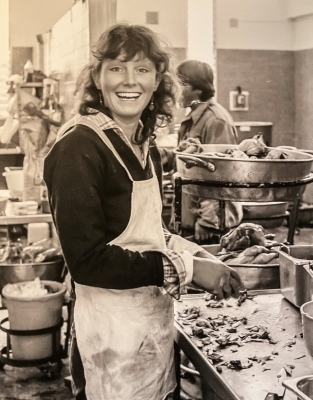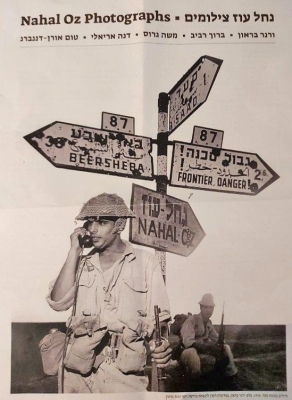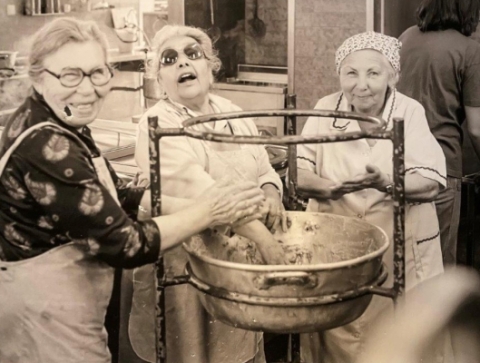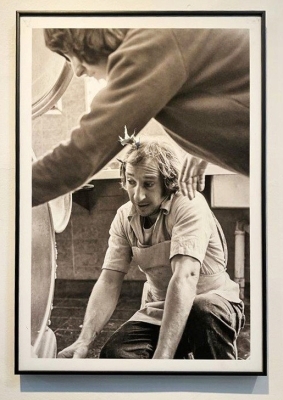Danny Rahamim - Nachal Oz
Text and Photos: Lydia Aisenberg
Slightly built and quietly spoken, 68-year-old Daniel (Danny) Rahamim understandably finds it upsetting to talk about the horrific events that took place at Kibbutz Nachal Oz on Black Shabbat, October 7, 2023 – but as the official spokesperson of the Nachal Oz community, he is daily having to meet with media representatives and address solidarity groups from Israel and abroad.
Nachal Oz was founded in 1951 by members of Nachal, a division of the Israel Armed Forces. It combined military service in a combat unit with living and working in an agricultural community, usually close to one of Israel's borders. It was whilst serving in Nachal that Danny arrived at Nachal Oz as a soldier in 1972. He decided to stay after finishing his army service and it was where he subsequently built his future home with British-born wife Siobhan (63) and where together they raised their three children and their grandchildren.
A former Londoner of Irish parentage, Siobhan – pronounced Shevaun – volunteered at Nachal Oz at a time when Danny, who worked for many years in the kibbutz poultry coops, was also responsible for the volunteers – and as they say, the rest is history!
Danny was born in Israel to parents who arrived in Israel from Baghdad, Iraq, in 1951. They lived in a sprawling ma'abara tent and wooden hut encampment set up for new immigrants at that time, near the coastal town of Hadera where his father worked at the then large industrial plant of the Hadera paper mill.
"My father had moved from the Kurdish oil city of Kirkuch to Baghdad, where he and my mother became friends and then married when they came to Israel. They lived in the ma'abara for nine years, having turned down offers to move to new areas being built at that time, such as Givat Olga. It was because my father said he did not want us to live in an area that would only be inhabited by fellow Iraqi immigrants, and so we were among the last families to leave the camp, moving to a mixed part of Hadera where there were people from all over the world.
"Every afternoon when we would all be playing outside, parents would call their kids for dinner. To this day I vividly remember just how many different languages were being used to call their kids home," explains Danny with a wistful smile.
Following the horrendous October 7 Hamas attack, when 15 of their community were brutally murdered and 5 taken as hostages to Gaza, the over 400 surviving, deeply traumatized adults and children of Nachal Oz were evacuated to their adoptee kibbutz in times of trouble, Mishmar HaEmek near Haifa. There they are settled and struggling to maintain their sense of community, to live as normal a life as possible under the most abnormal and traumatic of circumstances, and faced with more than an uncertain future, physically a long way from home but emotionally very much still there.
"During the 2014 Tzuk Eitan (Protective Edge) operation, when 4-year-old Daniel Tregerman was killed outside his home by a mortar fired from Gaza, those who wanted to evacuate were mostly families with children and they ended up in five different places. This is the first time, with all the various wars and special operations, that all the residents have evacuated their homes, and our collective home Nachal Oz, together," explains Danny.
"My wife and I were in our safe room from the minute the sirens sounded at dawn, until 12 midnight when we were evacuated by the army.
The terrorists were outside our building, we heard them speaking in Arabic. For some reason they didn't try to come into our house but went to the home of our 73-year-old neighbor and good friend Shoshi Brosh who lived 30 meters behind us. We heard shooting and later learned she had been murdered."
"Our youngest daughter Lian (30) lives in the nearby town of Netivot but our son, Eiram (39), his wife and three children live 500 meters from our house. My eldest daughter Karine (35), her partner and their one-year-old son, also live in Nachal Oz, not far from us. Neither we, nor they, could leave our safe rooms and the phone connection was extremely weak.
"Our daughter-in-law Ortal participates in a running group in Beer Sheva and she had left the kibbutz at 4am that morning to drive there and join in the run. Only when they finished and she got into her car to return home, did she realize that something terrible had happened and tried to phone her husband but got no reply.
"She then phoned us and we told her it was too dangerous to try and get back to the kibbutz but all she kept repeating was "my children, my children, they will murder my children." She started to frantically drive home, saw bodies at the roadside along the way and was thankfully stopped by the police near Netivot.
"All her attempts at calling Eiram failed but she managed to get through to us again and we told her to go to our daughter Lian in Netivot. We managed to get an SMS through to Eiram – it took 40 minutes from our house to his, we sat looking at the circle going around and around – and his answer also took about that long to come through as well. He wrote: "We are okay but I am afraid."
"Siobhan began to think it might possibly be a terrorist using Eiram's phone and so she was clear-headed enough to send a message to Eiram that only he would understand. She wrote: How do you spell your mother's name in English?
"It took an agonizingly long time for his SMS answer to come back. Again we watched the circle going around and around and then "SIOBHAN" appeared on the screen. We were so relieved and able later to let Ortal know they were okay."
Nachal Oz members had been preparing to celebrate the 70th anniversary of their kibbutz on the evening of October 7.
"For months there were preparations going on for the anniversary celebrations. There should have been a show, dancing, singing and much more, all in celebration of the rich history of Nachal Oz – the tough beginnings, the gradual development with all its up and downs, and the eventual successful community that in the last decade has absorbed almost 40 new families and with more waiting to join," he said proudly.
As part of the celebration, an exhibition of photographs from various periods of the development of the kibbutz had been on display in the dining-room and visitor center of Nachal Oz.
Among the black and white photographs of kibbutz members and overseas volunteers that hung on the wall, was one of Siobhan, nowadays employed in the Nachal Oz industry working in overseas relations, but back in those days … peeling potatoes. Another photograph is of buxom older ladies in the kibbutz gathered around the kitchen sink and others working alongside enormous metal cooking pots.
When Nachal Oz was attacked, Hamas bullets and rocket fragments riddled the building and some of the large, framed, black and white photographs of yore now bear witness with bullet holes or deep scratches incurred during the Shabbat attack 70 years after the kibbutz was founded.
Those photographs, and many more that were part of the in-house celebration of Nachal Oz, are now on exhibition at The Beit Shturman Museum of Kibbutzim Ein Harod and Tel Yosef near Beit Shean.
Written in February, 2024












Comments